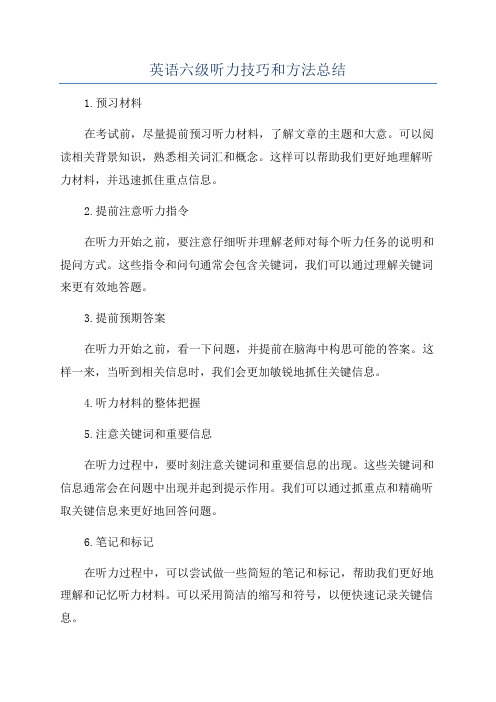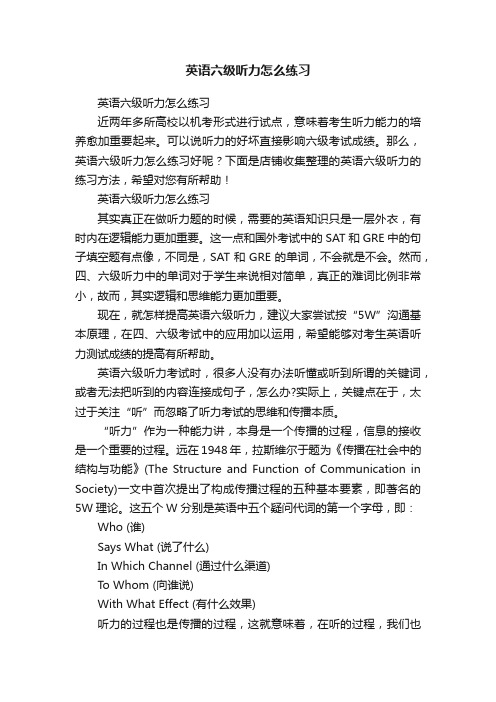英语六级听力做题方法
英语六级听力这么做,至少提分200+!

英语六级听力题型这么做能得高分!听力是英语六级考试中的重难点部分,也是大家丢分比较多的题型。
每种题型都有一定的总体答题技巧,只要大家掌握这些题型的答题技巧,英语六级听力题型就能快速过关。
一、英语六级听力改革题型了解六级听力取消了原来的短对话(长对话保持)和短文听写。
听力篇章从原先的3篇缩减为2篇。
新增讲座与讲话3篇,此题型与托福考试中的Lecture相似。
每篇Lecture,字数大约在350-450词左右。
四六级考试委员会在这次改革后给出的样题中,三篇讲座/讲话文章皆出自于托福试题。
大家可以看到,这次改革后六级考试的难度是有所增加的。
二、英语六级听力题型的难点所在篇幅方面:新增的Lecture部分,字数大约在350-450词左右,相较于短文部分(250词左右),篇幅上有了很大的提升,大家在听题的过程中,不容易抓住重点。
内容方面:英语六级题型所考话题也将不再是大家熟悉的校园类、生活类,而将转变为当前的社会与经济问题或是科技发展。
在托福考试中,讲座部分还经常会涉及到学科方面,因此整体的词汇表达对大家而言都相对陌生,难度系数大大增强。
针对这些听力变革后的难点,大家可以这么去复习备考这些题型。
三、英语六级听力题型技巧①词汇积累:除了原本六级听力高频词汇之外,大家还可以开始对于托福听力的高频词汇进行一定的积累和背诵。
原本的词汇学习,大家可以用真题学习,巨微英语《六级真题/逐句精解》就很不错,书中把阅读文章解析的很是详细,基础不好的人,很适合用它打基础。
对于托福听力高频词汇的积累,就要慢慢来了。
②掌握讲座/讲话的规律:通常,开篇会进行背景介绍以及话题引入;在正式的内容中,会从当前情况、面临问题、解决方法、未来展望等方面铺展开。
大家可以与审题相结合,提高对于文章的把握。
这种新题型大家还是要练习的,巨微英语送了听力改革新题型专训的小册子,建议大家多多练习,可以结合书中的听力满分兵法大总结学习听力做题技巧。
③英语六级听力题型长对话技巧:●视听基本一致加同义替换,长对话经常是听到什么就是什么,在选项里可能会拿同义词替换掉文中的词。
六级听力题型特点

六级听力题型特点一、题型和分值分布英语六级听力的总分为248.5分,占整套试题的35%。
英语六级听力包括以下三个题型:题型题目数每题分值占比长对话87.18%听力篇章77.17%讲话、报道、讲座1014.220%英语六级听力的难度较高,主要考察学术性的内容,而不是日常口语。
听力材料的长度较长,而且只播放一遍,要求考生能够快速捕捉细节和把握全局。
英语六级听力更加注重真实水平的考察,而不是技巧的运用。
二、题型和答题技巧1. 长对话长对话是两篇,每篇有四个问题,每个问题有四个选项。
长对话的内容通常涉及日常生活或学习工作的话题,比如旅游、购物、面试、求职等。
长对话的难点在于对话较长,信息量较大,而且只播放一遍,需要考生有较强的记忆力和理解力。
答题技巧:在听对话之前,先预览四个问题和选项,根据选项中出现的关键词判断对话的主题和问题的考点,有针对性地听取相关信息。
在听对话时,注意抓住对话中的转折词、提示词、强调词等,判断对话的逻辑关系和重点信息,排除干扰选项。
在听完对话后,尽快选择答案,并检查是否与问题相符,避免因为记忆模糊而错选。
2. 听力篇章听力篇章是两篇,每篇有三到四个问题,每个问题有四个选项。
听力篇章的内容通常是一段新闻报道或者广播节目,涉及社会、文化、科技、教育等方面的话题。
听力篇章的难点在于篇章结构复杂,信息密度高,而且只播放一遍,需要考生有较强的分析能力和推理能力。
答题技巧:在听篇章之前,先预览问题和选项,根据选项中出现的关键词判断篇章的类型和主旨,有针对性地听取相关信息。
在听篇章时,注意抓住篇章中的标题、开头、结尾等部分,判断篇章的主要内容和观点,以及作者的态度和目的。
在听完篇章后,尽快选择答案,并检查是否与问题相符,避免因为理解偏差而错选。
3. 讲话、报道、讲座讲话、报道、讲座是三篇,每篇有三到四个问题,每个问题有四个选项。
讲话、报道、讲座的内容通常是一段学术性的演讲或者讲座,涉及历史、政治、经济、文学等方面的话题。
六级听力速成蒙题全对方法

六级听力速成蒙题全对方法
1、快速阅读,在考试时,同学们就可以利用监考老师发放试卷以及播放题目要求的时间,快速浏览试卷中的选项,抓住关键信息。
2、边听边写:时间那么短,只是“听”这一项任务就已经完全占据了注意力。
将你听到的重点信息用自己能看懂的字符表示出来。
而且,要利用已有的语法知识,猜测没有听到的内容大致应该是什么词性,再结合语境猜测是什么词义。
3、如果四个选项中有两个或者三个你能感觉到在刚刚的听力中又听到,这时候建议选择你没听到的那个。
这种题一般是推断题,推断出的内容一般不会出现在听力原文当中。
4、如果一题的答案中有两个答案是近似的,只有一个单词或者短语不同,那么你可排除其余答案,再看这两个答案中的中心单词有没有和你排除的两个答案中重复的,如果有的话,你基本可以锁定那个正确答案了。
拓展资料:
英语六级听力考试技巧
a、考生要学会精神放松:如果对听力考试感到紧张或害怕,那么在自己的考场坐位上原地做几次深呼吸,这样可以有助于缓解紧张情绪。
b、排除杂念,注意力集中:坐在考场里,不要总想着:“听不懂怎么办?答错了怎么办?”这时千万不要心存顾虑,要稳定自己的情
绪,全神贯注于你的听力内容,尽自己最大的努力来考,这样才会发挥出最佳水平。
c、要力争主动,带着问题听:充分利用听力考试正式开始前2分钟的时间,将试题浏览一遍。
尽量争取在这2分钟内多看几道题。
正式开始做题之后,要严格控制答题时间,根据自己听懂的内容,尽快确定并标出答案。
倘若遇到难题,应当机立断,不要在该题上花太多的时间。
英语六级听力技巧方法

英语六级听力技巧方法1.提前熟悉听力考试形式:了解考试中常见的问题类型和题目形式,包括多项选择题、填空题、判断题等。
通过熟悉这些形式,你可以更好地理解考试要求并为之做好准备。
2.培养听力技巧:在平时的学习中,多进行听力练习,并尝试使用一些专门的听力材料。
这将帮助你提高对不同口音、语速和语气的理解能力。
3.关注关键信息:当你听到问题时,要有意识地筛选出关键信息,这样你在听到录音时可以更加专注于这些信息,从而更好地理解和回答问题。
4.制定快速阅读策略:在听录音之前,先快速浏览一遍问题,并尝试理解问题的主旨。
这样做可以帮助你有针对性地听取相关信息。
5.注意同义词和近义词:当你听到录音中的一些单词时,要注意它们的同义词和近义词。
这些词可能会在问题中出现,你需要通过对比来找到正确答案。
6.练习预测答案:在听录音时,尽量在脑海中形成一个答案的候选集,并在听完后进行验证。
这将帮助你更好地集中注意力并提高答题准确率。
7.注重记笔记:在听录音时,尽量做简洁的笔记来帮助你理解和记住关键信息。
可以使用简化的符号和术语,以便更快速地捕捉和理解录音中的内容。
8.改进词汇量:扩大词汇量是提高听力能力的关键。
通过大量的阅读和记忆词汇,你将更容易理解录音中的相关词汇。
9.锻炼长时间集中注意力:在备考期间,你需要锻炼你的长时间集中注意力,因为英语六级听力考试的录音较长。
通过练习长时间听力,你将更容易在考试中持续理解和处理信息。
10.反复练习和模拟考试:只有反复练习和模拟考试,才能真正提高你的听力水平。
模拟考试会让你更好地熟悉考试形式,帮助你适应考试的节奏和规律。
在备考期间,要有耐心和坚持,不仅要专注于听力技巧的学习和掌握,还需要进行大量的练习来巩固所学知识。
相信只要你付出足够的努力和时间,你一定能够在英语六级听力考试中取得好成绩。
祝你考试顺利!。
大学英语六级听力技巧讲解

★英语听⼒频道为⼤家整理的⼤学英语六级听⼒技巧讲解,供⼤家参考。
更多阅读请查看本站频道。
⼀、英语六级听⼒材料运⽤技巧 ⾸先,要有效率的对待历年考试真题。
有的同学盲⽬地陷⼊题海战术,在个⼈做题技巧尚不成熟的时候海量地做题;做题之后也⽋总结,就马上⼜去做下⼀套题了。
殊不知真题有限,没有结合技巧的⼤规模做题会浪费同学们很多考前实战模拟的机会。
还有的同学习惯⽤真题去"磨⽿朵",即⽆时不刻地在⽿边放着真题录⾳。
殊不知这样的学习习惯会使得你对于真题⾳频的敏感度下降,导致考场上的精神不集中。
所以,⼀定要在了解四六级听⼒出题规律、做题技巧的基础上练习真题;做题之后要对于做错的题⽬反复思索,找到你和正确答案的"思维差距"。
其次,要在做题之余做到泛听,提⾼适应纯正英语⾳频的能⼒。
⼀些同学希望在四六级听⼒考试中得到⼀个⽐较理想的分数,那么提⾼对于⾃⼰的要求、⽤更具挑战性的⾳频材料训练⾃⼰的⽿朵就是必不可少的⼀步了。
建议给位同学找到⼀些难度⾼于四级考试的⾳频材料,⽤这些材料做泛听。
当你可以跟得上且听得懂这些材料后,你再⾯对四级听⼒的⾳频就会很⾃然地产⽣⼀种"曾经沧海难为⽔"的感觉。
各位⽼师们建议各位参加四级考试的同学们可以试着去泛听六级的⾳频材料;参加六级考试的同学们可以找⽼托福的听⼒段⼦,或者慢速VOA 等等材料来进⼀步提⾼⾃⼰。
当然,所谓"泛听",也是要讲究⽅法和效率的。
要将"听"与练习记笔记、练习听写、总结知识点、跟读模仿等等步骤紧密联系起来,才能使得泛听达到事半功倍的效果。
⼀⾔以蔽之,各位考⽣在备考四六级听⼒的过程中要善于应⽤各种复习材料,善于将练习与各种命题规律、考试技巧以及良好的学习⽅法有机的结合起来。
只有这样,六级听⼒才能不再是影响各位考⽣通过考试的短板。
⼆、英语六级听⼒三⼤技巧 1、熟悉考试题型。
英语六级听力技巧和方法总结

英语六级听力技巧和方法总结1.预习材料在考试前,尽量提前预习听力材料,了解文章的主题和大意。
可以阅读相关背景知识,熟悉相关词汇和概念。
这样可以帮助我们更好地理解听力材料,并迅速抓住重点信息。
2.提前注意听力指令在听力开始之前,要注意仔细听并理解老师对每个听力任务的说明和提问方式。
这些指令和问句通常会包含关键词,我们可以通过理解关键词来更有效地答题。
3.提前预期答案在听力开始之前,看一下问题,并提前在脑海中构思可能的答案。
这样一来,当听到相关信息时,我们会更加敏锐地抓住关键信息。
4.听力材料的整体把握5.注意关键词和重要信息在听力过程中,要时刻注意关键词和重要信息的出现。
这些关键词和信息通常会在问题中出现并起到提示作用。
我们可以通过抓重点和精确听取关键信息来更好地回答问题。
6.笔记和标记在听力过程中,可以尝试做一些简短的笔记和标记,帮助我们更好地理解和记忆听力材料。
可以采用简洁的缩写和符号,以便快速记录关键信息。
7.注意词汇和句子结构要时刻留意听力材料中的生词和不熟悉的词汇,尽量猜测其意义。
同样地,要注意句子结构,理解句子的主谓宾关系和修饰关系,这有助于我们更好地理解长句和复杂句子。
8.利用上下文信息在听力过程中,利用上下文信息可以帮助我们更好地理解听力材料。
我们可以根据前后文的关系猜测出词汇和句子的意义。
9.留意转折词和连接词在听力中,转折词和连接词可以帮助我们判断句子的逻辑关系。
如however, but, therefore等。
当听到这些转折词时,我们要留意语境的变化,以便更好地理解文意。
10.听力训练最后,要进行听力训练。
可以选择一些模拟题目,多做几遍,以熟悉听力考试的题型和内容。
同时,也可以多听一些英语广播、新闻、电视节目等,提升听力能力。
总的来说,英语六级听力考试需要我们具备快速抓住关键信息、理解上下文和推理能力等技巧。
通过多练习、积累词汇和提高听力理解能力,我们可以提高英语六级听力考试的成绩。
六级听力技巧及细节

六级听力技巧及细节一、六级听力概述四六级的满分是710分,听力占比35%,共248.5分。
占比非常高,我可以负责人地说,听力直接决定了你六级能不能顺利通过。
如果你想稳过六级,你的听力至少要在149分,也就是听力及格分:149分你觉得哪个模块导致你六级没有通过从上面的图片可以看到,超过半数的同学觉得六级没有通过的原因是听力。
所以这个模块需要大家重点去准备。
六级听力又分为三个小板块:你会发现第三部分的讲座lecture占比巨高,换句话说,六级能不能过看听力,听力能不能过,看讲座lecture部分。
也就是说你前面听的不咋地其实不影响,主要是最后一个题型的得分。
但是讲座lecture部分也是听力时间最长,难度最大,最难得分的部分,所以我觉得,六级听力的技巧和方法相比较于其他项目是最低的,所以我们的重点还是应该提升自己的听力功底,重点放在准备,备考阶段。
切实把内容能听到,甚至能听懂,辅之我们的技巧,我相信通过是没问题的!六级听力最大的特点是出题形式,只给选项,不给题目。
题目放到听力中,听完文章后,最后读出题目。
这种出题形式包括难度我个人感觉已经跟托福越来越像了。
不仅文章单难,而且语速快,关键问题是文章还特别长,难度很大,很多同学会有一种感觉:感觉它在那里一直在那嘚吧嘚,根本听不懂在说什么。
这种特点决定了我们在做六级听力的时候,考试的时候,不需要完全听懂,你只需要选对选项,做对题目。
(你也不可能完全听懂,我之前上四六级的课,六级听力也带了很多学员,目前还没有发现一位同学可以从头到尾完全听懂的,当然也不排除特别优秀的同学)但是,你只需要掌握一定的听力方法和技巧,在有一定的听力能力之后,就可以化难为简,作对题目。
接下来是纯干货内容:本文分为两大部分:第一大部分——应试技巧,第二大部分——备考攻略。
我相信这些内容不仅可以让你顺利通过六级,并且会让你的英语听力上升到一个全新的高度。
(前提是你要努力按照我所讲的方法去做)鉴于现在很多同学比较着急提分,我就先说应试技巧吧。
英语六级听力怎么练习

英语六级听力怎么练习英语六级听力怎么练习近两年多所高校以机考形式进行试点,意味着考生听力能力的培养愈加重要起来。
可以说听力的好坏直接影响六级考试成绩。
那么,英语六级听力怎么练习好呢?下面是店铺收集整理的英语六级听力的练习方法,希望对您有所帮助!英语六级听力怎么练习其实真正在做听力题的时候,需要的英语知识只是一层外衣,有时内在逻辑能力更加重要。
这一点和国外考试中的SAT和GRE中的句子填空题有点像,不同是,SAT和GRE的单词,不会就是不会。
然而,四、六级听力中的单词对于学生来说相对简单,真正的难词比例非常小,故而,其实逻辑和思维能力更加重要。
现在,就怎样提高英语六级听力,建议大家尝试按“5W”沟通基本原理,在四、六级考试中的应用加以运用,希望能够对考生英语听力测试成绩的提高有所帮助。
英语六级听力考试时,很多人没有办法听懂或听到所谓的关键词,或者无法把听到的内容连接成句子,怎么办?实际上,关键点在于,太过于关注“听”而忽略了听力考试的思维和传播本质。
“听力”作为一种能力讲,本身是一个传播的过程,信息的接收是一个重要的过程。
远在1948年,拉斯维尔于题为《传播在社会中的结构与功能》(The Structure and Function of Communication in Society)一文中首次提出了构成传播过程的五种基本要素,即著名的5W理论。
这五个W分别是英语中五个疑问代词的第一个字母,即:Who (谁)Says What (说了什么)In Which Channel (通过什么渠道)To Whom (向谁说)With What Effect (有什么效果)听力的过程也是传播的过程,这就意味着,在听的过程,我们也需要这样的“思维经历”。
实际上,在听的过程完全可以遵循这个脉络,从who入手,说话人中,重要的说话信息一般在第二说话人中,他说了什么,是我们做题的重点,即所谓的关键词。
通过的途径一般有两种,conversation与paragraph,to whom 就是我们自己,而效果的考核就是我们题目。
- 1、下载文档前请自行甄别文档内容的完整性,平台不提供额外的编辑、内容补充、找答案等附加服务。
- 2、"仅部分预览"的文档,不可在线预览部分如存在完整性等问题,可反馈申请退款(可完整预览的文档不适用该条件!)。
- 3、如文档侵犯您的权益,请联系客服反馈,我们会尽快为您处理(人工客服工作时间:9:00-18:30)。
2011年12月大学英语六级考试已进入冲刺备考阶段,中国教育在线外语频道为广大考生整理了2011年12月大学英语六级听力解题技巧,希望对英语六级考生们有所帮助。
六级听力题目构成与比例小对话: 8% 选择题共8段小对话,8道题长对话: 7% 选择题共2段长对话,7道题短文听力: 10% 选择题共3篇文章,10道题复合式听写:10% 听写填空填8个单词和三句话,放音三遍听力位于考试的卷二部分,共占全卷35%。
六级听力选择题目答题方法点拨一,基本解题思路小对话:视听反向原则、同义替换原则。
视听反向原则是指,在小对话的题目中,看似明显被读到的选项反而更容易是错的。
但须注意,当小对话原文本身较长或生僻词较多时,该原则可能会出现特例,如03年6月第8题。
同义替换是指,若某一选项中的单词或短语是听力原文中单词或短语的同义形式,则该选项容易为正确。
例题:2002年6月六级考试第4题A. The woman doesn’t think it a problem to get her passport renewed.B. The woman has difficulty renewing her passport.C. The woman hasn’t renewed her passport yet.D. The woman’s passport is still valid。
原文:M: Have you run up against any problems in getting the passport renewed?W: I haven’t started applying yet。
Q: What do we know from the conversation?解析:可以明显看出,本题的答案为D。
其中,另外三项的大部分单词或短语都被读到。
”valid”意为“(在一段时间内)有效的”。
例题:2007年6月六级考试第15题A. More money.B. Fair treatment.C. A college education.D. Shorter work hours。
原文:W: I hear your boss has a real good impression of you and he is thinking about giving you two more days off each month。
M: I hope not. I’d rather get more work hours so I can get enough bucks to help out my two kids at college。
Q: What does the man truly want?解析:准确答案A。
More money 替换enough bucks,同义替换,听到的慎选。
例题:2008年12月六级考试第16题A. Fixing some furniture.B. Repairing the toy train。
C. Reading the instructions.D. Assembling the bookcase。
原文:M: The instructions on the package say that you need to do some assembly yourself. I’ve spent all afternoon trying in vain to put this bookcase together。
W: I know what you mean. Last time I tried to assemble a toy train for my son and I almost gave up。
Q: What does the man find difficult?解析:准确答案D。
assemble 和put...together同义替换,听到部分的慎选。
长对话和短文听力:视听基本一致原则、同义替换原则、特殊词定位原则视听基本一致的含义是指,若听到的原文和看到的选项基本一致,则选项容易为正确。
这一点和小对话的原则恰恰相反,请考生一定注意。
同义替换原则,同小对话。
特殊词定位原则是指,在原文中特殊词(如序数词1st,极端词most、most important、only,逻辑连接词because、since、but、however,以及自问自答的回答部分)后面很可能出现正确答案信息。
例题:2009年6月六级考试第1道长对话:Questions 19 to 21 are based on the conversation you have just heard。
19. A. Current trends in economic development。
B. Domestic issues of general social concern。
C. Stories about Britain’s relations with other nations。
D. Conflicts and compromises among political parties。
20. A. Based on the poll of public opinions。
B. By interviewing people who file complaints。
C. By analyzing the domestic and international situation。
D. Based on public expectations and editors’ judgment。
21. A. Underlying rules of editing。
B. Practical experience。
C. Audience’s feedback。
D. Professional qualifications。
答案:BDB原文:Long conversation oneW: You’re the editor of Public Eye. What kind of topics does your program cover?M: Well, there are essentially domestic stories. We don’t cover international stories. We don’t cover party politics or economics. We do issues of general social concern (19题答案,视听基本一致原则)to our British audience. They can be anything from the future of the health service to the way the environment is going downhill。
W: How do you choose the topic? (听到choose the topic,同时看到20题选项by 和based on,即可猜到20题是与这个问题关联的)Do you choose one because it’s what the public wants to kno w about or because it’s what you feel the public ought to know about?M: I think it’s a mixture of both。
(第20题答案,需要简单概括归纳)Sometimes you have a strong feeling that something is important and you want to see it examined and you want to contribute to a public debate. Sometimes people come to you with things they are worried about and they can be quite small things. They can be a story about corruption in local government, something they cannot quite understand, why it doesn’t seem to be working out properly, l ike they are not having their litter collected properly or the dustbins emptied。
W: How do you know that you’ve got a really successful program? One that is just right for the time?M: I think you get a sense about it after working in it in a number of years(21题答案,同义替换practical experience). You know which stories are going to get the attention. They are going to be published just the point when the public are concerned about that。
Q19-2119. What kind of topics does Public Eye cover?20. How does Public Eye choose its topics?21. What factor plays an important role in running a successful program?例题:2009年6月六级考试第3篇短文听力第34题34.. A. There was a bomb scare。
B. There was a terrorist attack。
C. A fire alarm was set off by mistake。
D. 50 pounds of explosives were found。
答案:A原文:There was another bomb scare in a large London store last night(34题答案,视听基本一致原则) during late night shopping. Following a telephone call to the police from an anonymous caller, hundreds of shoppers were shepherded out of the store while roads in the area were sealed off. Police dogs spent hours searching the store for a bag which the caller claimed contained 50 pounds of explosives. Nothing was found and the store was given the all-clear by opening time this morning.A police spokesman said that this was the third bomb scare within a week and that we should all be on our guard。
